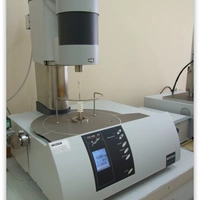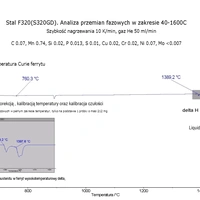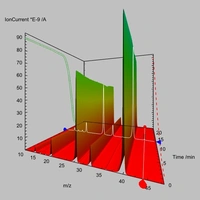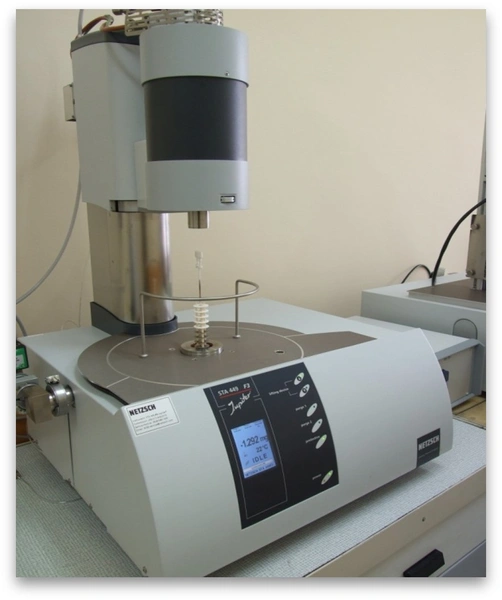Termowaga, kalorymetr
Badania zmian właściwości termicznych materiałów pod wpływem zastosowanego programu temperaturowego oraz atmosfery pomiarowej. Urządzenie wyposażone jest w wagę o rozdzielczości 0.1 µg oraz piec pozwalający na wykonywanie badań w zakresie temperatur od 25 do 1600°C w atmosferze obojętnej (argon/hel 6N) lub utleniającej (powietrze syntetyczne 6N). Nośnik DSC oraz DTA umożliwią identyfikację efektów cieplnych procesów aktywowanych w próbce pod wpływem zmian temperatury lub pod wpływem reakcji próbki z atmosferą pomiarową. Rodowe elementy grzejne pieca oraz dedykowany nośnik DSC cp zapewniają precyzyjne wyznaczenie ciepła właściwego materiału w zakresie temperatur do 1400°C. Nagrzewanie próbek z szybkościami od: 0.001 do 50 K/min. Do analizator można podłączyć kwadrupolowy spektrometr masowy QMS, który umożliwia identyfikację emitowanych z próbki cząsteczek gazowych (o masach do 300 amu) oraz połączenie intensywności wydzielania produktów gazowych z towarzyszącymi im zmianami masy próbki oraz ich efektami cieplnymi. Orientacyjna objętość analizowanych próbek: TG: max. 10 ml, DSC: 0.19 ml, DTA: 0.9 ml.
Infrastruktura udostępniana jest bezpłatnie w przypadku realizowanych wspólnie projektów/grantów z jednostkami organizacyjnymi AGH oraz podmiotami zewnętrznymi, w których operator/opiekun urządzenia jest członkiem zespołu publikującego wyniki badań. W pozostałych przypadkach udostępnianie infrastruktury jest odpłatne zgodnie z obecnie obowiązującym kosztem pracy urządzenia oraz operatora. W obu przypadkach koszt materiału wsadowego pokrywa zamawiający.
Analiza przemian fazowych materiałów w stanie stałym, określenie temperatury solidus/likwidus stopów, analiza temperatury wydzielania faz podczas krzepnięcia stopów, analiza zmienności ciepła właściwego, analiza zmian masy próbki w funkcji czasu lub temperatury pomiaru, identyfikacja gazów uwalnianych z próbki podczas pomiaru.
DSC DTA różnicowa analiza termiczna, detekcja efektów Exo/Endo termicznych towarzyszących procesom zachodzącym w analizowanych materiałach pod wpływem zastosowanego programu temperaturowego. Analiza zmienności ciepła właściwego materiałów metodą porównawczą. TG: termograwimetria, analiza zmian masy próbki w wyniku: dehydratacji, utleniania, redukcji, rozpadu termicznego. Analiza EGA: analiza gazów uwalnianych z próbki podczas badania.




Jednostka odpowiedzialna
Grupa / laboratorium / zespół
Materiały i Procesy Wytwarzania Przyrostowego / B4 - 3Ha / https://www.plastmet.agh.edu.pl/